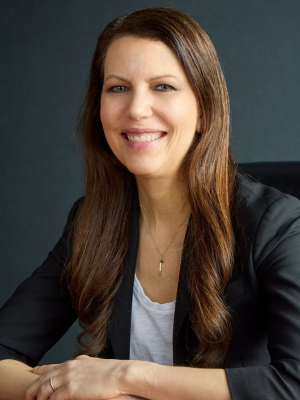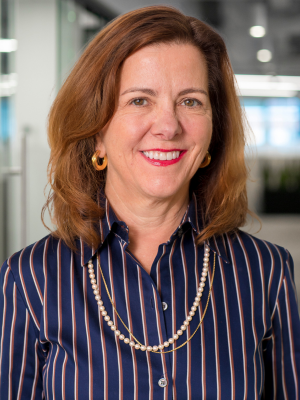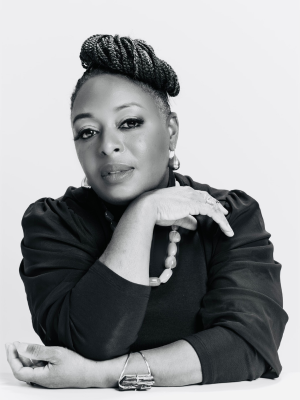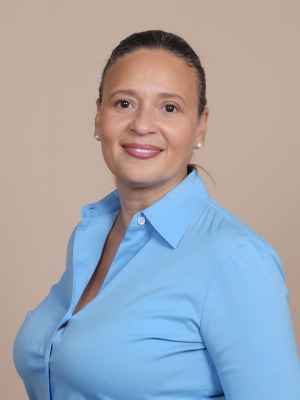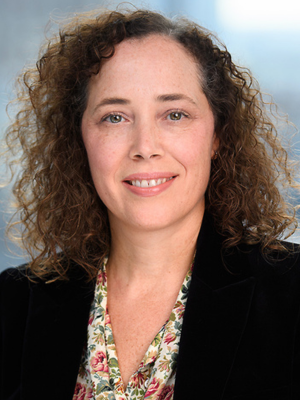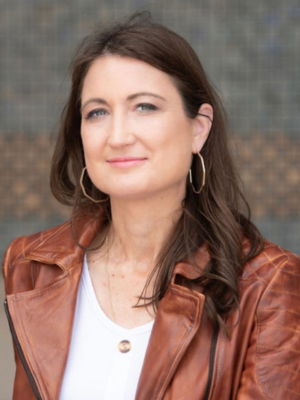 “A couple of things are true for everyone. One, every person will experience hardship. It’s the human condition. Two, no one invites or wants or desires hardship. But three, the art of living is to find the space in between those two things.”
“A couple of things are true for everyone. One, every person will experience hardship. It’s the human condition. Two, no one invites or wants or desires hardship. But three, the art of living is to find the space in between those two things.”
We talked to Lindsey Roy, SVP Strategy & Brand at Hallmark Cards. At 31, she was named vice-president at Hallmark, one of the youngest VPs in the 100+ year history of the company. Five years later, at 36 years old and with two young children, she was nearly killed in a boating accident and left with an amputated leg and severe limb injuries. In 2017, after years of recovery and adaptation, she delivered a TEDx Talk entitled “What Trauma Taught Me About Happiness.”
Then, at 44 years old, having already fully adapted to several major life changes with the support of her husband Aaron and two children, Roy was diagnosed with a rare and progressive disease that destroyed the blood vessels in her lungs, requiring a double lung transplant in the summer of 2022. The road to recovery started once again.
Across 24 years at Hallmark Cards, Roy has held 12 positions while raising two children, having two life-saving surgeries, adapting to life changes, and recalibrating her dreams. In her book, The Gift of Perspective, she shares “Wisdom I Gained From Losing a Leg and Two Lungs.” She seeks to build our collective wisdom of how to walk the challenges we each face while also lifting each other up. Her story has been featured in Forbes, Fast Company, O Magazine, and Working Mother.
On what to do when “why me” comes up in the midst of challenge:
“I have learned there is zero wisdom in asking, ‘Why me?’ It is a road to nowhere. It is a circular reference, infinitely looping. I have spent hours and cycles learning that. In my latest journey with my lungs, when that sentiment would come up, I would mindfully stop my brain from going there. If it would start to wonder there, I would make my brain stop mid-thought and actively think, I’m not even going to entertain the thought.
Others would also say to me, ‘I can’t believe you’re going through this. You’ve already been through so much. It’s not fair.’ But I wouldn’t entertain that. I would try to shut it down, and say, ‘Everybody goes through things. I just had the National Enquirer (sensational) version of problems. That doesn’t mean they’re harder. Problems are relative.’
I would redirect, because ‘why me?’ is simply the biggest waste of time. You’ll never solve it, so shut it down. I’m also a person of faith, so the question was also, ‘Why not me?’ How am I supposed to know how my life was supposed to be when only God knows that?”
On whether challenges shape us or reveal who we are:
“Both. I do believe that as humans, there’s a lot of ‘who we are’ that is already predetermined and pre-established from formative experiences. Those things often are latent, or even unknown, to ourselves, so there is an element of revelation: I might not have known I had those pieces. And that’s akin to the quote from Bob Marley: ‘You never know how strong you are until being strong is your only choice.’ There’s a lot of truth to adversity revealing parts of yourself.
But, there is definitely also a shaping piece. I now know things that you cannot know because of my experiences. I truly do believe that’s the point of sharing – because you’re never going to know what I know and I’m never going to know what you know. That’s why my purpose is to share: it adds to our collective wisdom. How beautiful that we can each pick up a gem of wisdom from someone else’s path to help us each walk our own.”
On how being confronted with adversity has impacted upon her outlook:
“Honestly, there weren’t many circumstances in my life that had put me in the empathetic seat to feeling otherized. In many ways, I had traditional ‘pathing’ and a more privileged set of circumstances. Then, I was suddenly thrown into being a member of the disabled community, the sick mom at school events, the person missing at work due to a disability situation. All of the sudden, I was a member of a lot of new clubs. I was an amputee, for example. That is a club I never expected to be a member of. I never expected to have a handicap parking pass in my 30s.
Being thrown into this world made me realize a couple of things. One, I learned something about what it feels like to be a part of a community that is not the majority. It gave me a different window into that experience. Two, it made me realize that no matter how hard I try, I’m never going to fully understand the lived experience of someone who is in another category of otherized groups of people. I won’t claim to have a full understanding, but I have a different viewpoint than I would have had without these experiences.”
On how challenges are relative and only internally defined:
“People will start to say to me, ‘My hip is really hurting.’ And then they’ll stop and say, ‘I’m so sorry, that’s nothing compared to what you’ve dealt with.’ I hear this all the time: ‘I’ve got this challenge. No, wait, I shouldn’t even say this to you.’ Even though it’s well intended, I find serious flaw in that thinking. First of all, nobody wants to win the lottery for having the worst problems. Nobody wants to hear, ‘You win: your problems are worse.’
But even more importantly, challenge is so relative because it’s infinitely dimensional. No one knows what your support system is, what resilience you’ve had the opportunity to build or to not build, or what you value most in life. For instance, if someone loses their hair to chemotherapy, that might be much harder on somebody who’s always had beautiful hair as part of their identity versus someone who’s always hated their hair. No one knows how much you value that particular dimension of life. I could name a hundred of these frames, because it is all so relative. So don’t feel shameful about sharing something that’s hard for you. Don’t default to believing that someone else’s challenges are harder. Challenge is relative and depends on so many things. You just can’t compare, and it’s not healthy to do so: it’s another road to nowhere.
Here’s my own little example of not comparing: I always have finger pain because having an extreme version of Raynaud’s Syndrome is one of the common traits of my specific autoimmune disease. My fingers have been in pain on and off for over a decade, lacking the necessary blood flow to keep them warm and high-functioning. I will get skin ulcers on the tips of my fingers or lose part of a fingernail from time to time. You would assume annoyances in your fingers would pale in comparison to having half a leg or an incision across my entire chest from a lung transplant. But on many days, it’s actually been worse. I doubt many people would guess that pain comparison correctly. It just shows you cannot know about somebody else’s challenges. That’s why I find it helpful and connective to talk to other people about what we’ve collectively learned even though our challenges are very different. I heard a profound notion the other day: I may not know your specific pain, but I know pain. How very true for so many of us.”
On navigating hardship through acceptance and beyond:
“The first thing is to know that it’s inevitable that hardship will happen and second, you will despise it. Third, it’s about coming to acceptance. Acceptance is the bottom of the pyramid of dealing with hardship, and even getting to that point is a huge challenge.
Once you can accept and even embrace that a hardship ‘is what it is’ and it’s not going to change, you then have two choices: to either dwell in a negative cycle or to try to create something beneficial out of it. If you can arrive to those points of acceptance, and get your brain in a place where you can spin something good out of it, beautiful things can happen.
I’ve gone through this cycle two big times and many little times. I’ve learned so much about how to make those pathways a little shorter and a little easier that I want to share with others. By no means is it easy: it’s very difficult. But if you know the path, it makes walking it slightly easier. I’ve found doing so is much better than the alternative.”
On why perspective is “the most powerful untapped resource”:
“Here’s a visual metaphor for perspective. Imagine an amazing pool of fresh water that’s the perfect temperature for drinking. It’s a perfectly clear, beautiful mountain stream. We all thirst for that, but we only get to sample little teaspoons here and there. We don’t normally choose when we sample those, because we usually only sample perspective in reaction to other people’s trauma, struggles, and pain. So every once in a while, we’ll hear something that makes us taste that water and all of our surface level worries dissipate. Then we think, ‘Wow, that puts things in perspective.’
I’ve found this water is always available as a resource to us, but you have to choose to walk over, bring a cup and drink. You have to actively do things. For example, the metaphorical walking over is sitting and thinking, ‘this situation looks like a horrible situation, but there’s a thousand things that are going right’ or it looks like asking ‘how could this be worse?’ That’s picking up your cup and taking active steps towards that water. But if you’re the kind of person passively sitting back and waiting on someone to throw you a teaspoon or shower you with a couple of drops, you’re not ever going to really tap into the resource of perspective. It’s actively doing even these exercises that seem so mundane and so silly. But in practice, in the wake of hardship, that’s exactly where the magic happens. You just have to understand how to walk over to that amazing pool, time and time again.
It’s almost like someone saying, ‘You want to be healthier? Exercise and eat well.’ That may be the simplest advice in the world. But it’s very different to hear it than to do it. It’s the same with sustaining perspective.”
On the power of putting perspective into practice:
“I have so many visual, visceral memories of being alone in middle of the night in hospital bathrooms in my rawest, most lonely moments. And I would say aloud, ‘How could this be worse? What is going right?’ And I would make my brain answer the question, and it was so enlightening and powerful, but very simple. It’s very hard and humbling to do that in those raw, raw, raw moments. But it is about making yourself feel vulnerable and silly, and go through the process anyway.
I would come up with things that would buy me enough resource to make it through the night or next day. I would think things like, ‘What’s the worst thing that can happen here?’ Many of those answers could get pretty dark. But then I would say, ‘Okay, let’s think about how that would be.’ I would let myself go to those worst places and instead of fear them, I would walk in those rooms in my mind. Sometimes, I would just try to let go of the control I was trying to grasp and do the thing we proverbially say, ‘Give it to God.’ That helped me more than words can say.
In short, I’ve found that you have to continually work at shifting your perspective to keep your brain focused on anything but those enticing negativity traps. The more you can focus on creating neural pathways that are more positive in nature, the more you train your brain to get better at this type of thinking.
I think it’s also important to add that you don’t have to be perfectly positive every day. There have been countless days where I have wailed or banged my fists or struggled to get out of bed. That’s ok too. But you have to find a way to keep moving forward, and actively shifting how you see things is incredibly powerful in the midst of hardship.”
On overcoming resistance to practicing perspective:
“First of all I would invite any individual to introspectively ask: what stops you from actually exercising your perspective? One suspicion is that I think people feel dumb doing these very simple things because they do seem so mundane and unhelpful until you actually do it. I think some people dismiss that sheer thought of the power of doing this stuff, but it can only be experienced by doing it.
I’m guessing, too, that negativity bias can take over. It’s taken over in my life so many times. You have to hold off that negativity bias to even create the space to ask these silly questions. That negativity bias is an 800 pound gorilla. It will come at you. Your brain is so wired for that. Just having the fortitude to fight that off for five minutes is no small thing.”
On the strategy of “borrowing perspective” in hardship or everyday life:
“When you’re in the middle of hardship or facing a certain fear, you can try ‘borrowing perspective’ from anybody who has gone through a similar situation and arrived to the other side. From where the stand, you can borrow their perspective and say, ‘If they can do this, I can.’
For example, witnessing what Amy Purdy had overcome and achieved with her two prosthetic legs (from world champion para-snowboarder to Dancing With the Stars finalist) became a lifeline of inspiration after my boating accident. I could see beyond the moment I was in. But consider even the more common experience of having a baby. When I was pregnant for the first time, along with all the excitement, I had some fear of childbirth. But I would remind myself that billions of women have had babies throughout history. If so many women had done it before me, surely I could.
There’s also ‘borrowing perspective’ as a daily practice so you don’t slip into taking things for granted. This is harder. When you’re in hardship, you’re searching for coping mechanisms. But when you’re going about your daily life, and things are going well, we often just coast. In those coasting moments, borrowing perspective would be to pause and recognize things we often don’t give any thought to, such as, ‘Wow, I live in America today instead of a war torn country’ or ‘I was just able to walk into the baseball game with functioning legs and lungs.’
Right now, we’re talking about my hard stuff, but I have a million blessings. For example, I grew up in a home where my parents loved each other and offered me love unconditionally. I have a wonderful husband and two amazing kids. I’ve always loved my job. There are a million gifts that we take for granted simply because we haven’t had to experience the broken version of that experience.”
On why authenticity and vulnerability are essential to leadership:
“It’s a trap to believe there is a certain way we are supposed to be to be successful. For example, we equate leader mentality to an ‘early bird gets the worm’ mentality. I’m a night owl. My hours are more bartender than typical Corporate America. You’re supposed to wear heels. I can’t wear heels. You’re supposed to not talk too much about your kids. That’s the most important thing in my life!
The more you can just be who you are, the more powerful that is. Whatever it is that you have that’s different, it can be something that truly makes you unique, but you can’t be scared of it. You have to let that difference shine and that takes courage and vulnerability. Being vulnerable feels like being exposed, being naked, letting someone see that part of yourself that you don’t think you should show. But that’s where your authenticity will make others appreciate you even more and where you can find your special sauce to add value to any team or situation. It’s important to find the space where you’re comfortable and have that courage to bring in more of yourself.
For myself, I’ve always been the same person whether 10:00 at night or 10:00 in the morning at work. But I’ve learned it’s also about sharing the ugly parts of yourself in the right setting, in the right way: that’s where connection happens.
Being vulnerable is connective. When someone has been vulnerable with you, you trust them more. When you take the lead and show vulnerability, it engenders trust. I have seen this so many times, and most recently, after speaking in a manufacturing plant in Kansas City. Most of the audience were men and they were telling me the most beautiful, vulnerable things that had happened in their life, because I threw it all out there first.
Vulnerability is a flywheel. Somebody has to take the lead to get it moving.”
On letting who you truly are authentically guide your path:
“There’s this type A personality model we’ve pedestaled where you have the calendar, menu and schedule planned. To some degree, that behavior is necessary and awesome. If you’re authentically that kind of person, great. But it’s also okay if you’re not.
When I was starting, people used to give me the advice to map out my career. Later, they’d advise to do three years of this project or take this lateral move to gain an experience for promotion. I would secretly dismiss that advice, even as a young professional, because it was never my mentality to do those things. I would also borrow perspective by looking at others who’d never worked in that division, or sought out a masters degree, or whatever – and were doing great. Today, I don’t have a masters and I didn’t do jobs I hated. I was in an environment of great mentors: being in fertile soil helps.
No one set of advice works for everybody. You don’t have to take advice that you don’t want to take. There are things that will unfold for you that maybe no one else could have predicted. Let that happen. Just be you, let go a bit, and see what happens.
Everyone is going to give you advice. Even in medicine, I’ve learned that if you ask ten different people the same question, often you’re going to get two to ten different answers. Many questions don’t have a precise singular answer. Now, if you get ten out of ten same answers, maybe you should follow that advice. But if you get nine one way and one the other, then you get to weigh your decision with that in mind. I think there’s a lot of power in that. But it’s vulnerability inducing to even entertain those thoughts.”
On the power of being able to let go of the plan and embrace the now:
“When I was 20 years old, I thought the perfect age to get married would be 26, the perfect age to have a baby would be 28, and the perfect place to live would be X…none of those things happened. That movie did not play out. Now when I look back at my life, I didn’t know the perfect age to do this or the right way to do that.
People say ‘this is more than I ever imagined.’ That can absolutely be true, but it can only be true if you let go of your preconceived notion of how it should be and realize there is no perfect plan. There’s only what actually plays out and how you embrace that. But there’s so much value in letting go of what was and being okay with what is.
Also, it’s human nature to compare. But if you’re going to compare, don’t let your brain compare things to a state that you can’t control. You can’t control when you fall in love, when someone hires you, or the result of a physical accident. So do not let yourself compare to some preconceived notion or some past, because it is another circular reference to the path to nowhere. It’s fruitless and futile. You will never be able to get out of that hole.
Rather, what you can do is say that didn’t happen. This did happen. What can I attach myself to now? To use a metaphor, imagine you’re swimming down the river because you fell out of a boat. You might want to be back in that boat, but that’s not an option anymore. So you better grab a tree to hold onto. May you’ll find that tree is cool and beautiful, and you’re going to hang out there. But you can’t compare to things that you thought had to happen. I’ve failed many times, but the consciousness of this line of thinking is what’s important.”
On learning how to trust in and surrender to your unique life path:
“I’ve had to work really hard on growing my trust, and for me that means having faith. Of five brands of belief I have identified that have supported me, that’s the most important one. It’s so easy to say it, but very different to really open yourself up to that relationship where God is truly in control. For me, trusting really is letting go and realizing that there is a path I’m supposed to walk. I don’t get to pick that path, but I can find joy in walking it, no matter what it looks like to others.
Years ago, we had the traveling Titanic exhibit in Kansas City. When you walked in, you received a secret little envelope. At the end, you were told your fate based on math. Are you someone who drowned? Are you someone who survived? It was just based on the math of the event and the math of the people walking through.
God handed me this little secret envelope that I’ve only read 20% of or 40% of, or who knows, and I don’t get to change what’s in that envelope. But the more I embrace what’s in that envelope and realize that once again, I’m not in control, the better everything is. It’s believing deep down that whatever it is, it’s going to be okay, so give up the control. I’m constantly reminding myself to go back and find my center there. And when I do, it is the most freeing feeling ever.”
Interviewed by Aimee Hansen
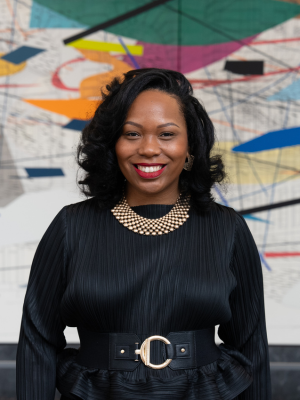 “I found my way to my career, but it wasn’t a career that I even knew existed, or even had visions of wanting to become,” says Shekhinah Bass, Managing Director, Head of Talent Strategy, at Goldman Sachs. “No one in my family had gone to college. No one had worked on Wall Street; all of these things were completely new to me. Oftentimes people say that you can’t become what you can’t see, but you can.”
“I found my way to my career, but it wasn’t a career that I even knew existed, or even had visions of wanting to become,” says Shekhinah Bass, Managing Director, Head of Talent Strategy, at Goldman Sachs. “No one in my family had gone to college. No one had worked on Wall Street; all of these things were completely new to me. Oftentimes people say that you can’t become what you can’t see, but you can.”
